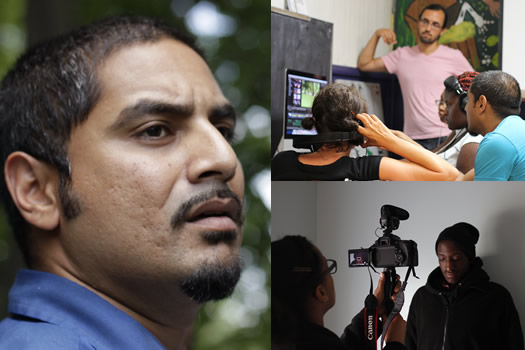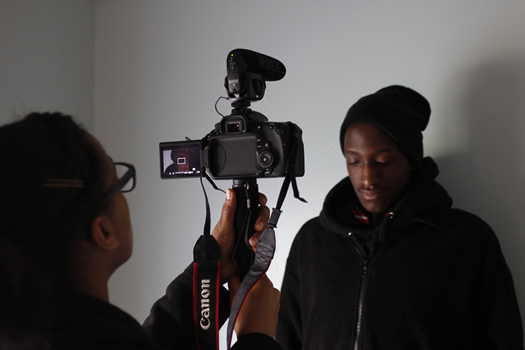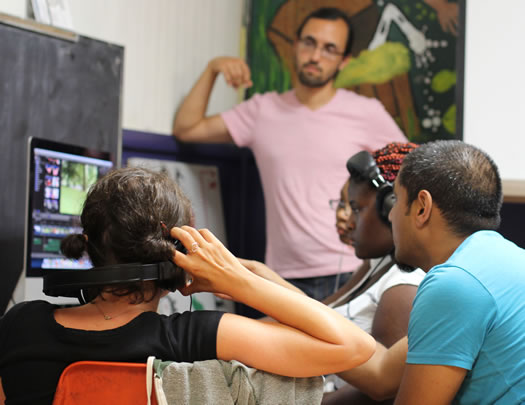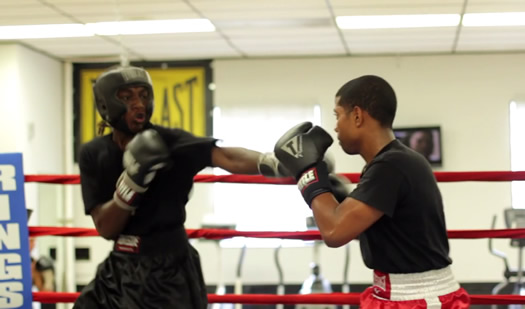Hey there, Bhawin Suchak, YouthFX program director

Bhawin Suchak (left) and YouthFX help teens learn media production skills.
The modern world is a media-saturated world. If there's ever been a time to be a conscious consumer of the text, images, and ideas circulating all around us, it's now.
So we've been very interested in a program in Albany called YouthFX. It helps teens learn the skills associated with video production. Not only does that help these young people become active participants in media -- but becoming a producer also helps you become a more critical consumer of media.
After a recent sold-out screening of its latest batch of projects, YouthFX has an encore screening of lined up for The Spectrum April 2 at 6:30 pm. Tickets are $10 for adults / $5 for students.
We had a chance to talk this week with the program director for YouthFX, Bhawin Suchak -- about how the program got started, about being a critical consumer of media, about "kids these days," and media that sees its subjects eye to eye.
For people who aren't familiar, what's the quick background on YouthFX, how does it work?
The program started in 2007. I started being involved in Grand Street Community Arts and I wanted to get something going regarding digital media and filmmaking, which is something that I'm really passionate about. I just really enjoy doing it. I've been a filmmaker since 2002.
So the main thing that I do is that I work at the Albany Free School, so YouthFX was this idea I had to combine two of my passions, teaching and filmmaking. And it happened that we had gotten an invitation from Upstate Independents -- which is a local filmmaking collective and networking group -- to participate, they had a grant for workshops for youths. We developed this idea that turned into a summer program, so that first year we worked with some local filmmakers and it was a very small scale thing. And the grant sort of expired after a year, and we said we got this going, let's keep it going, we got some kids who want to come back. We built in additional components for the kids to learn about, the different aspects of actually writing the scripts, coming up with entire concepts from beginning to end. We started doing mainly narrative films, but my interest is in documentaries and I was also interested in having the young filmmakers in the program exploring things that are going on in their community. So, talking about issues that they might be dealing with, projects or community organizations that their either a part of or they feel need to get highlighted, or that they want to know about.
So, the program grew out of that beginning, the idea of giving this skill set and this outlet for young people mainly where I'm living -- which is in the South End -- to a population that doesn't have a lot of access. Before we started there wasn't much access to digital media tools and production tools. There wasn't really a space for young people to learn these skills. As YouthFX has grown we've also sort of been able to feed some other things like a mediaworks program at Albany High School, which is now incorporated into the school day. And then we have YouthFX in the after school program now, so kids can actually earn high school credits by doing the after school program.
So things have really started taking off, but it just started with this idea that I wanted to share my skills, which I didn't think were available to them.

One of the things that's interesting to us about YouthFX is that it's teaching people how to be producers of media, instead of just consumers of media. What do you think are the effects of turning these kids into producers?
That's really exciting, to watch that. Because a lot of students are taking this beyond just sort of the summer program, or the after school program. Some of them are actually becoming media producers. I have a student now who's been in the program for six years and he's at Saint Rose. He got hired by the career center to create short media pieces for their social media site. We have another student who's actually teaching at Albany High now. So some of them it's opened up this entire career path for them, or path of creativity and expression they didn't have.
One of the things that's really interesting is that I'll have some of my students come to me and say, "You've ruined films for me. Now every time I watch a movie I'm constantly analyzing stuff and thinking about it." You know, it's half joking but also half serious. They've opened this whole other side of their viewing experience because they're really thinking critically about all the different aspects. Who's making this? And what's the message? And what are people trying to get out of this?
And part of it, too, is that a lot of them have gained an appreciation for independently creative work. Exposing them to independent films, taking them to film festivals, showing them the whole world of Vimeo where's there's a lot more independent film work, and interesting use of video and experimental stuff and documentaries that they might have never seen if they were just surfing the net on YouTube or the videos that come up in their Facebook feed.
So I've seen my role also to help young people be aware of the messages that are produced by mainstream media -- and that that media has an agenda. Especially for most of the kids in the program, they're youth of color, so they're not seeing themselves necessarily represented in the mainstream media. And if they are, sometimes it's not in the most positive light. So they have an opportunity to sort of turn that paradigm on its head a little bit and say we're in control of the message, we're in control of creating films and documentaries and things that we're going to put out our own voices through these projects.
So I think for some of them this has been a pretty amazing experience. And the other part of it is exposing them to the culture of film and art in Albany. Some of them have gotten involved in theater projects through YouthFX.

It's probably true of every generation that the generations that come before always try to stigmatize it or make generalizations about it, and [those generalizations] are almost always unfair. The word right now about younger people is that they're technology obsessed, they have short attention spans, and so on and so on. As much as you can generalize -- and that's always dangerous -- what do think are some things that differentiate kids today versus when people who are adults now were kids? What makes kids stand out now?
I think kids today, part of that generalization about attention span, you see it in some negative aspects. But the thing I've noticed about them is that they're really able to multitask in ways that are fascinating sometimes, in ways I can't actually do myself. And part of what their multitasking looks like on a film set and when you're in production is that you're able to incorporate lots of different people's points of view.
So what ends up happening is that even though you might see two names credited as directors, you'll always see production assistants on a YouthFX project and it's a whole bunch of kids. It's not written by one person, it's written by seven people. Because they're in spaces where even if they're not directly engaged in the process at that moment, a conversation breaks out and there are four or five people involved, and then it goes back to just two people working on the script, and then all of sudden there are seven people and they're all arguing about this one aspect of the story that should be fleshed out.
So there's this interesting ability to go in and out of spaces, and have some meaningful input. Sometimes it drive me a little crazy, as someone who is not from that younger generation, where I'm just like, "Can you guys just sit down and focus and get through this script and bang it out?" And stop going, "Oh, wait a minute, this will be awesome, let me show you this music video and this clip, how they did this shot, we should incorporate..." Literally, someone will think of a shot, and show someone on YouTube. And what's awesome is that and they'll incorporate it into the script, what the shot was, and then all of sudden they have this really dynamic visual before they even get out to wherever they're going to shoot.
Obviously, there are some negatives to that, but it's an interesting skill because it's almost perfect for people who are producing media. Because you sort of end up needing to have this hydra approach -- you gotta be able to edit, you gotta be able to visualize, to get the audio right. If you can kind of multitask in these ways, and work together with a bunch of people -- and not feel like you have to have control over it.
That's the other part I'm amazed by. Collaboratively, they're not attached to ownership. And I think that maybe that's something from sharing of information, free sharing of music and videos, and YouTube and stuff like that. There's this really incredible thing that goes on where everything become entirely collaborative -- everything: producing the beat that's going to go with this, where they're going to shoot something. So everyone collaborates in a way that's very seamless. I think there's something to really be excited about that, generationally, about the kids I'm working with.
Can think about an example of something, or a moment, or a production, where you've thought, "This is what this program was created to do"?
One of our films from last year, Inside the Ring, is a short documentary about the Quail Street boxing gym, which is a city-run program for youth. This coach, Jerrick Jones, has been there for 15 years. It's a perfect example of something that people in Albany -- I've lived in Albany since 1996 and never knew about this. I mean, I knew that it existed, but I never knew anything about in a deep way before the students in YouthFX said we need to make a documentary about this boxing gym. And it's so funny because it really came out of the idea of the visuals and saying what does it feel like to be in this boxing gym, and there are some stories in there.

To me, that's a great example of the potential of youth media. Because the way they told the story was really at eye level with the young people involved in the program. Obviously the coach is a big part of it, and he's interviewed. But what really sort of pops in this piece is the kids, the boxers, telling their stories and why they're a part of it.
You know, it's an untold story. A lot of people come up to me after it and they're like, it's amazing I never knew that exists, where is that. And it's a city program, so you'd think the city would have some sort of PR aspect to what they're trying to do, to say look at this amazing thing that's happening.
And so to me, that's a great example of not just highlighting challenges and things that are hard, but celebrating successes. And saying, look, here's something that's going on in our community, a lot of African-American boys, they're not engaged in all sorts of negative things which is what the media wants you to think. But here are some positive things that are going on.
So Inside the Ring, to me, has been an amazing project. And it's getting a ton of national recognition. We just got into the San Francisco International Film Festival, which is really huge. And this other one in Seattle called the National Film Festival for Talented Youth, which is the world's largest youth film festival. So there are some really big stages that this film will be get be played at. And it's because I think it has an energy, the way it was filmed, that's young people talking to young people.
This interview was edited and condensed.
____
Bhawin Suchak (his first name is pronounced "bah-win") says the biggest hurdle for YouthFX right now is money. They're currently looking sources of funding, whether it's grants or individual donors. There's a donate button right on the YouthFX website.
... said KGB about Drawing: What's something that brought you joy this year?